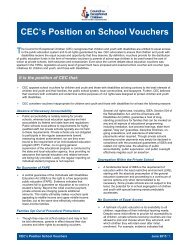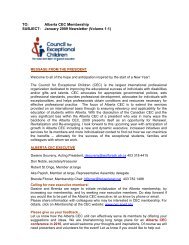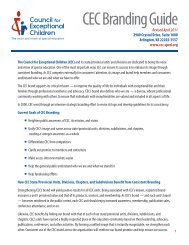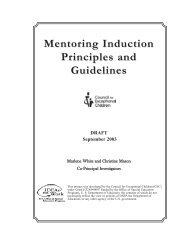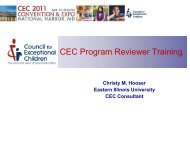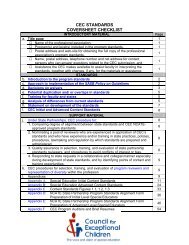What Every Must Know Special Educator - Council for Exceptional ...
What Every Must Know Special Educator - Council for Exceptional ...
What Every Must Know Special Educator - Council for Exceptional ...
Create successful ePaper yourself
Turn your PDF publications into a flip-book with our unique Google optimized e-Paper software.
a. Nondiscriminatory, ongoing assessment of career<br />
interests, needs, and potentials which assures<br />
recognition of the strengths of the individual which<br />
can lead to a meaningful, satisfying career in a<br />
work oriented society. Assessment materials and<br />
procedures must not be discriminatory on the basis<br />
of race, sex, national origin, or exceptionality.<br />
b. Career awareness, exploration, preparation, and<br />
placement experiences in the least restrictive<br />
school, living, and community environments that<br />
focus on the needs of the exceptional individual<br />
from early childhood through adulthood.<br />
c. Specification and utilization of community and<br />
other services related to the career development<br />
of exceptional individuals (e.g., rehabilitation,<br />
transportation, industrial and business,<br />
psychological).<br />
d. Involvement of parents or guardians and the<br />
exceptional student in career education planning.<br />
Career education must not be viewed separately<br />
from the total curriculum. Rather, career education<br />
permeates the entire school program and even extends<br />
beyond it. It should be an infusion throughout the curriculum<br />
by knowledgeable teachers who modify the<br />
curriculum to integrate career development goals with<br />
current subject matter, goals, and content. It should<br />
prepare individuals <strong>for</strong> the several life roles that make<br />
up an individual’s career. These life roles may include<br />
an economic role, a community role, a home role,<br />
an avocational role, a religious or moral role, and an<br />
aesthetic role. Thus, career education is concerned<br />
with the total person and his or her adjustment <strong>for</strong><br />
community working and living.<br />
Paragraph 22 - Treatment of<br />
<strong>Exceptional</strong> Persons in Textbooks<br />
The <strong>Council</strong> proposes the following points as guidelines<br />
<strong>for</strong> early childhood, elementary, secondary,<br />
and higher education instructional materials so they<br />
more accurately and adequately reflect persons with<br />
exceptionalities as full and contributing members of<br />
society.<br />
a. In print and non-print educational materials,<br />
10% of the contents should include or represent<br />
children or adults with an exceptionality.<br />
b. Representation of persons with exceptionalities<br />
should be included in materials at all levels (early<br />
childhood through adult) and in all areas of<br />
study.<br />
c. The representation of persons with exceptionalities<br />
should be accurate and free from stereotypes.<br />
d. Persons with exceptionalities should be shown in<br />
the least restrictive environment. They should be<br />
shown participating in activities in a manner that<br />
will include them as part of society.<br />
e. In describing persons with exceptionalities, the<br />
language used should be nondiscriminatory and<br />
free from value judgments.<br />
f. Persons with exceptionalities and persons without<br />
exceptionalities should be shown interacting in<br />
ways that are mutually beneficial<br />
g. Materials should provide a variety of appropriate<br />
role models of persons with exceptionalities.<br />
h. Emphasis should be on uniqueness and worth of<br />
all persons, rather than on the differences between<br />
persons with and without exceptionalities.<br />
i. Tokenism should be avoided in the representation<br />
of persons with exceptionalities.<br />
Paragraph 23 – Technology<br />
The <strong>Council</strong> <strong>for</strong> <strong>Exceptional</strong> Children recognizes that<br />
the appropriate application and modification of present<br />
and future technologies can improve the education<br />
of exceptional persons. CEC believes in equal access<br />
to technology and supports equal educational opportunities<br />
<strong>for</strong> technology utilization by all individuals.<br />
Present technologies include electronic tools, devices,<br />
media, and techniques such as (a) computers and<br />
microprocessors; (b) radio, television, and videodisc<br />
systems; (c) in<strong>for</strong>mation and communication systems;<br />
(d) robotics; and (e) assistive and prosthetic equipment<br />
and techniques. The <strong>Council</strong> believes in exploring<br />
and stimulating the utilization of these technologies in<br />
school, at home, at work, and in the community.<br />
CEC encourages the development of product standards<br />
and consumer education that will lead to the<br />
appropriate and efficient matching of technological<br />
applications to individual and local conditions. CEC<br />
recognizes the need to communicate market needs and<br />
market expectations to decision makers in business,<br />
industry, and government.<br />
CEC supports the continuous education of professionals<br />
who serve exceptional individuals, through<br />
(a) collection and dissemination of state-of-the-art<br />
in<strong>for</strong>mation, (b) professional development, and<br />
(c) professional preparation of personnel to per<strong>for</strong>m<br />
Appendix 9: CeC profeSSionAl poliCieS 263




